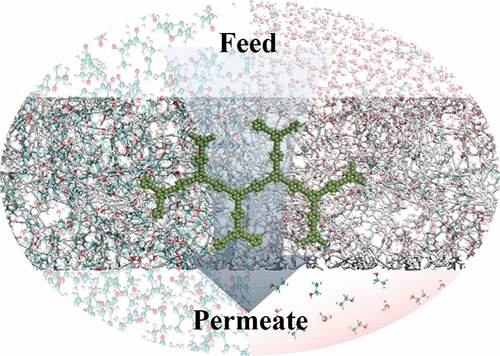当前位置:
X-MOL 学术
›
ACS Sustain. Chem. Eng.
›
论文详情
Our official English website, www.x-mol.net, welcomes your
feedback! (Note: you will need to create a separate account there.)
A Highly Rigid and Conjugated Microporous Polymer Membrane for Solvent Permeation and Biofuel Purification: A Molecular Simulation Study
ACS Sustainable Chemistry & Engineering ( IF 7.1 ) Pub Date : 2020-02-13 , DOI: 10.1021/acssuschemeng.9b07207 Jie Liu 1, 2 , Wan Wei 1 , Jianwen Jiang 1
ACS Sustainable Chemistry & Engineering ( IF 7.1 ) Pub Date : 2020-02-13 , DOI: 10.1021/acssuschemeng.9b07207 Jie Liu 1, 2 , Wan Wei 1 , Jianwen Jiang 1
Affiliation

|
With rigid π-conjugated skeletons and permanent micropores, conjugated microporous polymers (CMPs) have attracted increasing interest. Nevertheless, most current studies for CMPs are largely focused on the adsorption of gases and organic molecules. Herein, a molecular simulation study is reported to investigate a CMP membrane (p-CMP) for solvent permeation and biofuel (represented by ethanol/water mixtures) purification. The permeabilities of four solvents (methanol, ethanol, acetonitrile, and acetone) are predicted and found to match well with available experimental data. Between the permeability and solvent properties (i.e., viscosity and molecular size), a good correlation is established. Due to the hydrophobic nature of p-CMP, the solvent–membrane interaction is largely attributed to the nonpolar group of solvent. For ethanol/water separation, ethanol flux is observed to increase with increasing ethanol composition xe in the mixture, while water flux remains nearly constant. The total flux through p-CMP is about 5 times of that through PIM-1 membrane for ethanol/water mixture at xe = 10 wt %, and the separation factor is 15 times higher. Moreover, the total flux is approximately two orders of magnitude larger than that of MFI membrane at xe = 5 wt %. This simulation study microscopically elucidates the experimentally observed solvent permeation through p-CMP membrane, predicts the performance for biofuel purification, and suggests p-CMP membrane might be useful for high-performance separation.
中文翻译:

用于溶剂渗透和生物燃料纯化的高刚性共轭微孔聚合物膜:分子模拟研究
具有刚性的π-共轭骨架和永久性微孔,共轭微孔聚合物(CMP)引起了越来越多的兴趣。尽管如此,目前对CMP的大多数研究都主要集中在气体和有机分子的吸附上。本文中,据报道进行分子模拟研究以研究用于溶剂渗透和生物燃料(以乙醇/水混合物表示)纯化的CMP膜(p -CMP)。预测了四种溶剂(甲醇,乙醇,乙腈和丙酮)的渗透率,发现与现有实验数据非常吻合。在渗透性和溶剂性质(即粘度和分子大小)之间,建立了良好的相关性。由于p的疏水性-CMP,溶剂-膜相互作用主要归因于溶剂的非极性基团。对于乙醇/水分离,观察到乙醇通量随混合物中乙醇成分x e的增加而增加,而水通量保持近乎恒定。对于x / e = 10 wt%的乙醇/水混合物,通过p -CMP的总通量约为通过PIM-1膜的总通量的5倍,分离系数高15倍。此外,在x e = 5 wt%时,总通量比MFI膜大约两个数量级。该模拟研究从微观上阐明了通过p进行的实验观察到的溶剂渗透-CMP膜可预测生物燃料纯化的性能,并建议p -CMP膜可能对高性能分离有用。
更新日期:2020-02-13
中文翻译:

用于溶剂渗透和生物燃料纯化的高刚性共轭微孔聚合物膜:分子模拟研究
具有刚性的π-共轭骨架和永久性微孔,共轭微孔聚合物(CMP)引起了越来越多的兴趣。尽管如此,目前对CMP的大多数研究都主要集中在气体和有机分子的吸附上。本文中,据报道进行分子模拟研究以研究用于溶剂渗透和生物燃料(以乙醇/水混合物表示)纯化的CMP膜(p -CMP)。预测了四种溶剂(甲醇,乙醇,乙腈和丙酮)的渗透率,发现与现有实验数据非常吻合。在渗透性和溶剂性质(即粘度和分子大小)之间,建立了良好的相关性。由于p的疏水性-CMP,溶剂-膜相互作用主要归因于溶剂的非极性基团。对于乙醇/水分离,观察到乙醇通量随混合物中乙醇成分x e的增加而增加,而水通量保持近乎恒定。对于x / e = 10 wt%的乙醇/水混合物,通过p -CMP的总通量约为通过PIM-1膜的总通量的5倍,分离系数高15倍。此外,在x e = 5 wt%时,总通量比MFI膜大约两个数量级。该模拟研究从微观上阐明了通过p进行的实验观察到的溶剂渗透-CMP膜可预测生物燃料纯化的性能,并建议p -CMP膜可能对高性能分离有用。





















































 京公网安备 11010802027423号
京公网安备 11010802027423号